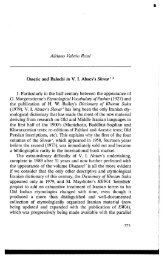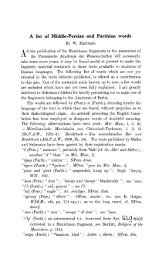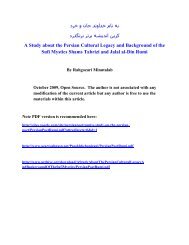Comparative Notes on Hurro-Urartian, Northern Caucasian
Comparative Notes on Hurro-Urartian, Northern Caucasian
Comparative Notes on Hurro-Urartian, Northern Caucasian
Create successful ePaper yourself
Turn your PDF publications into a flip-book with our unique Google optimized e-Paper software.
elated to the participle. 95 The idea that <strong>on</strong>e pers<strong>on</strong> is (or will be) feeding nine kings<br />
makes it clear that the narrati<strong>on</strong>, although associated with the history of Ebla, is to be<br />
understood as a mythological <strong>on</strong>e. In a parallel tablet (K Bo XXXII 20 Rs. IV 16-17) the<br />
Hurrian passage just cited is repeated. But before it a story of m Purra- in c<strong>on</strong>necti<strong>on</strong> to<br />
the Eblaitic and other kings is told (cf. the equative form m Purra-nna and Genitive<br />
m Purra-wii : ib., Vs. I 7’, 8’). Unfortunately, without the Hittite translati<strong>on</strong>, which is<br />
absent or quite fragmentary, it is impossible to understand the plot; still, it seems that<br />
Purra appears as an important historical and/or mythological pers<strong>on</strong> whose fate is<br />
miraculously bound to a st<strong>on</strong>e. 96 If his name is really c<strong>on</strong>nected to the noun purra-<br />
“slave”, it can be understood as part of the peculiar structure of the Hurrian-Hittite epic<br />
poetic narrati<strong>on</strong>, in which the topic of slavery and of the slave/pris<strong>on</strong>er being set free is<br />
discussed via the example of the highest god of the panthe<strong>on</strong> Teshop or of such an<br />
important Slave = pris<strong>on</strong>er as Purra.<br />
In the other parts of the same Hurrian text the noun purra- is used without the<br />
determinative of a male pers<strong>on</strong>al name, as opposed, for instance, to the name m Me-e-ki,<br />
which is always preceded by this cuneiform sign. In the corresp<strong>on</strong>ding Hittite text the<br />
determinative is used regularly with the Hittite m Purra. Thus the Hurrian noun is not<br />
translated but is simply transliterated by the Hittite translator (or a later scribe copying<br />
the text), who understood it as a proper name (this is the interpretati<strong>on</strong> followed by<br />
modern scholars 97 ). Accordingly, just as in the previous cases, it is possible to<br />
understand Hurrian Purra (as well as the Hittite m Purra that renders it) as a proper<br />
name (probably originally meaning “Priest < Slave of the God”). But as shown by Neu,<br />
in this part of the story al<strong>on</strong>e, the Hittite translati<strong>on</strong> (which seems to have been written<br />
in the Middle Hittite period, much later than the Hurrian text) differs from the Hurrian<br />
original. In the latter Purra does not rejoice (Íi-in-zu-uh-ha-am-ma a-ni-ik-ki Pur-ra-a-bi<br />
“in the sec<strong>on</strong>d place (= <strong>on</strong> the other hand) Purra’s [heart, menti<strong>on</strong>ed <strong>on</strong>ly in the<br />
beginning of the whole passage] does not rejoice” [K Bo XXXII 15 I 22’-23’]). The Hittite<br />
rendering gives the opposite picture: ta-a-an pé-e-di-ma-kán A.NA m Pur-ra a-ap-pa pí-<br />
95 Cf. Speiser 1941, 171-172; Laroche 1980, 174. See above <strong>on</strong> another view in Girbal 1990.<br />
96 Neu 1996, 444-445, 461.





